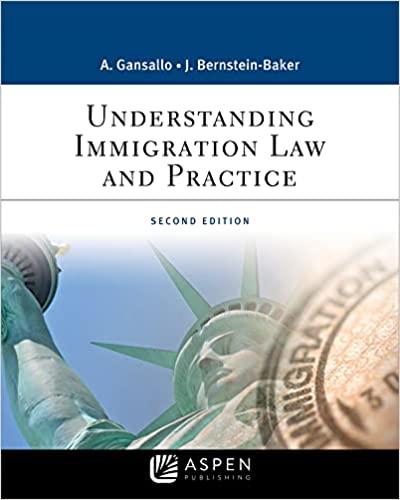Question
Discussion Questions: 1. Does Florida have a statute that addresses a minor's misrepresentation of age when entering into a contract? Information to answer the question:
Discussion Questions:
1. Does Florida have a statute that addresses a minor's misrepresentation of age when entering into a contract?
Information to answer the question:
Capacity
A contract is a meeting of minds. If someone lacks the mental capacityto understand what he is assenting toor that he is assenting to anythingit is unreasonable to hold him to the consequences of his act.
The general rule is that persons younger than eighteen can avoid their contracts. Although the age of majority was lowered in most states during the 1970s to correspond to the Twenty-sixth Amendment (ratified in 1971, guaranteeing the right to vote at eighteen), some states still put the age of majority at twenty-one. Legal rights for those under twenty-one remain ambiguous, however. Although eighteen-year-olds may assent to binding contracts, not all creditors and landlords believe it, and they may require parents to cosign. For those under twenty-one, there are also legal impediments to holding certain kinds of jobs, signing certain kinds of contracts, marrying, leaving home, and drinking alcohol. There is as yet no uniform set of rules.
The exact day on which the disability of minority vanishes also varies. The old common-law rule put it on the day before the twenty-first birthday. Many states have changed this rule so that majority commences on the day of the eighteenth (or twenty-first) birthday.
A minor's contract is voidable, not void. A child wishing to avoid the contract need do nothing positive to disaffirm; the defense of minority to a lawsuit is sufficient. Although the adult cannot enforce the contract, the child can (which is why it is said to be voidable, not void).
When the minor becomes an adult, he has two choices: he may ratify the contract ordisaffirmit. She may ratify explicitly; no further consideration is necessary. She may also do so by implicationfor instance, by continuing to make payments or retaining goods for an unreasonable period of time. (In some states, a court may ratify the contract before the child becomes an adult. In California, for example, a state statute permits a movie producer to seek court approval of a contract with a child actor in order to prevent the child from disaffirming it upon reaching majority and suing for additional wages. As quid pro quo, the court can order the producer to pay a percentage of the wages into a trust fund that the child's parents or guardians cannot invade.) If the child has not disaffirmed the contract while still a minor, she may do so within a reasonable time after reaching majority.
In most cases of disavowal, the only obligation is to return the goods (if he still has them) or repay the consideration (unless it has been dissipated). However, in two situations, a minor might incur greater liability: contracts for necessities and misrepresentation of age.
Contract for Necessities
At common law, a "necessity" was defined as an essential need of a human being: food, medicine, clothing, and shelter. In recent years, however, the courts have expanded the concept, so that in many states today necessities include property and services that will enable the minor to earn a living and to provide for those dependent on him. If the contract is executory, the minor can simply disaffirm. If the contract has been executed, however, the minor must face more onerous consequences. Although he will not be required to perform under the contract, he will be liable under a theory of "quasi-contract" for the reasonable value of the necessity.
Misrepresentation of Age
In most states, a minor may misrepresent his age and disaffirm in accordance with the general rule, because that's what kids do, misrepresent their age. That the adult reasonably believed the minor was also an adult is of no consequence in a contract suit. But some states have enacted statutes that make the minor liable in certain situations. A Michigan statute, for instance, prohibits a minor from disaffirming if he has signed a "separate instrument containing only the statement of age, date of signing and the signature:" And some states "estop" him from claiming to be a minor if he falsely represented himself as an adult in making the contract. "Estoppel" is a refusal by the courts on equitable grounds to listen to an otherwise valid defense; unless the minor can return the consideration, the contract will be enforced.
Contracts made by aninsane or intoxicatedperson are also said to have been made by a person lacking capacity. In general, such contracts are voidable by the person when capacity is regained (or by the person's legal representative if capacity is not regained).
Step by Step Solution
There are 3 Steps involved in it
Step: 1

Get Instant Access to Expert-Tailored Solutions
See step-by-step solutions with expert insights and AI powered tools for academic success
Step: 2

Step: 3

Ace Your Homework with AI
Get the answers you need in no time with our AI-driven, step-by-step assistance
Get Started


